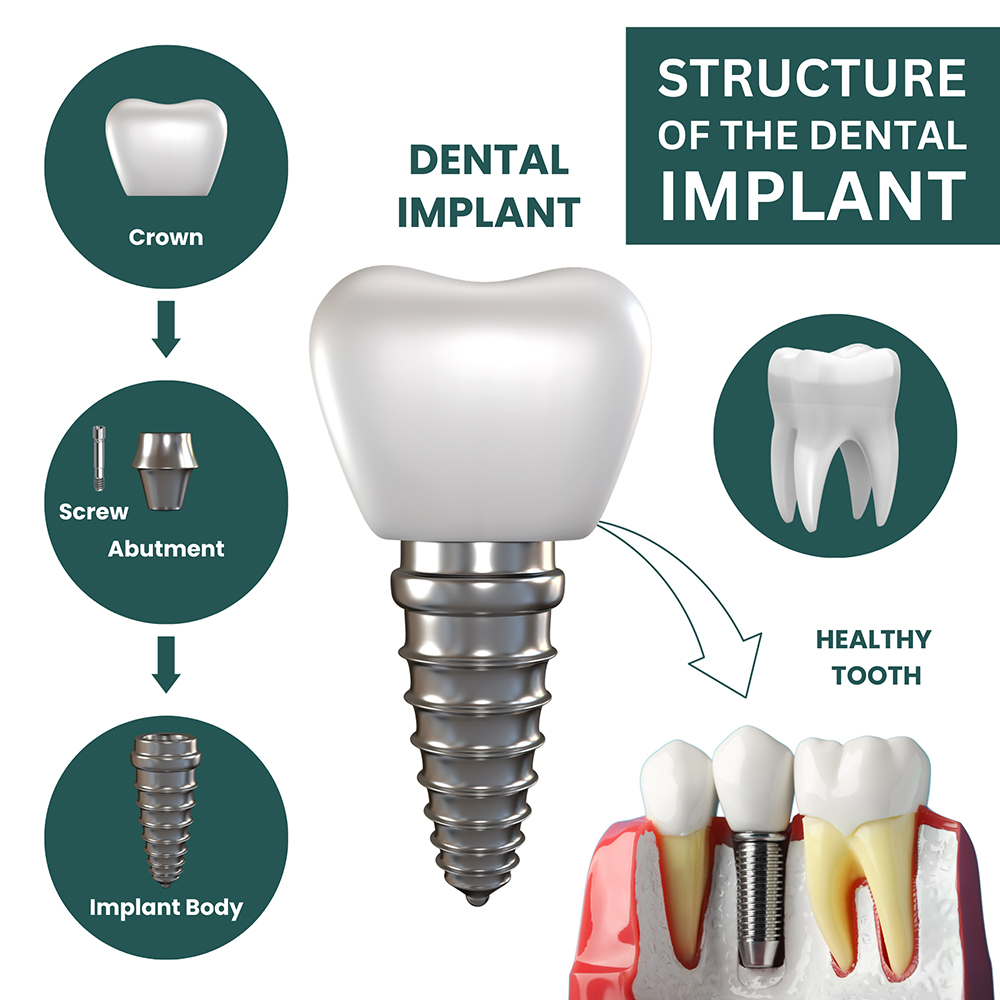Dental Sense Things To Know Before You Get This
Dental Sense Things To Know Before You Get This
Blog Article
Excitement About Dental Sense
Table of ContentsThe Dental Sense IdeasThe smart Trick of Dental Sense That Nobody is Talking AboutAn Unbiased View of Dental SenseHow Dental Sense can Save You Time, Stress, and Money.
are clinical tools operatively implanted into the jaw to recover a person's capability to chew or their look. They offer support for artificial (phony) teeth, such as crowns, bridges, or dentures. When a tooth is shed due to injury or disease, an individual can experience difficulties such as quick bone loss, defective speech, or adjustments to chewing patterns that result in pain.Oral dental implant systems contain a dental implant body and oral implant abutment and may also consist of a joint addiction screw. Dental implant vs bridge. The oral implant body is operatively placed in the jawbone instead of the tooth's root. The dental implant abutment is generally connected to the implant body by the abutment addiction screw and prolongs via gum tissues into the mouth to support the attached artificial teeth
(https://triberr.com/dentalsense1)Framework of The Oral Implant System selecting dental implants, talk to your dental supplier concerning the possible benefits and risks, and whether you are a prospect for the procedure. Things to take into consideration: Your overall health and wellness is an essential factor in establishing whether you are an excellent candidate for oral implants, for how long it will certainly require to recover, and the length of time the dental implant may stay in location.
Cigarette smoking may influence the healing process and lower the lasting success of the implant. The recovery procedure for the implant body may take several months or longer, throughout which time you commonly have a temporary joint instead of the tooth. the dental implant treatment: Very carefully follow the oral health guidelines offered to you by your oral service provider.
Everything about Dental Sense
Implant failing can result in the demand for another surgical procedure to take care of or change the dental implant system. Restores the ability to eat Restores aesthetic appearance Assists maintain the jawbone from diminishing as a result of bone loss Preserves the wellness of the surrounding bone and gum tissues Aids keep surrounding (neighboring) teeth steady Improves top quality of life Damages to surrounding natural teeth during implant placement Injury to the surrounding tissues throughout surgery, such as sinus perforation Injury throughout surgical treatment (for example, crack of surrounding jawbone) Poor function, such as seeming like the teeth do not attack with each other normally An experience that the tooth hangs or twisting in position arising from an abutment screw loosening Implant body failure (looseness of the implant body) because of systemic infection, which might be most likely in clients with uncontrolled diabetes as a result of neighborhood infection in bone and periodontals supporting the implant body as a result of postponed healing, which might be more probable in individuals that smoke Trouble cleaning up the gum tissues around the implant, leading to bad dental health Without treatment periodontal disease Post-surgical numbness due to nerve impingement or damages Always notify wellness care companies and imaging professionals that you have oral implants prior to any kind of magnetic vibration imaging (MRI) or x-ray procedures.
FDA is not familiar with any adverse events reported for MRI or x-ray procedures with dental implants. Dental implants systems are typically made from products that comply with global consensus criteria of the International Organization for Standardization (ISO) or ASTM International. These standards have information of what makes a safe product.

A dental implant is a framework that replaces a missing tooth. With screw-like gadgets, the cosmetic surgeon inserts a dental implant right into the jawbone, and it functions as an anchor for an artificial tooth, called a crown. A tool called an abutment links the man-made tooth to the dental implant. The crown site here is tailor-made to fit the individual's mouth and match the shade of their teeth.
Dental Sense Can Be Fun For Anyone
Some people are not qualified for dental implant surgical treatment. It is for oral doctors to run on people with: intense illnessuncontrollable metabolic diseasebone or soft cells condition or infectionIf these problems are fixed, a person can have the surgical treatment. In, oral doctors avoid operating on individuals with: If people with any of the above go through dental implant surgery, there is a greater threat of the dental implant falling short.

Dental dental implant surgery is a tailored procedure. Provide you time to recover. Affix the post and final crown, bridge or denture.
Next, your surgeon will meticulously put the oral implant right into your jaw. If your dental implant is near the front of your mouth, your dental practitioner will make a temporary tooth for you to put on up until you heal.
The Of Dental Sense
During the healing stage, your jawbone ought to fuse to the oral implant. This procedure can take anywhere from 3 to 9 months.
Once your implant heals, your dental expert can affix the joint (tiny adapter article) and your final restoration (crown, bridge or denture). This generally takes regarding one hour to finish and may call for a second minor surgery. You should not feel any discomfort during your dental implant treatment due to the fact that your provider will certainly use medicine to numb your gum tissues.
Report this page